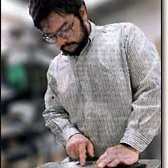
John N. Louie
- Courses2
- Reviews3
- School: University of Nevada
- Campus: Reno
- Department: Geology
- Email address: Join to see
- Phone: Join to see
-
Location:
1664 N Virginia St
Reno, NV - 89557 - Dates at University of Nevada: December 2003 - August 2005
- Office Hours: Join to see
Biography
University of Nevada Reno - Geology
Resume
1982
PhD
Degrees: Ph.D. Geophysics
June
1987; M.S. Geophysics
June
1983. \nDoctoral Thesis: Seismic reflection experiments imaging the physical nature of crustal structures in Southern California. \nThesis Advisor: Robert W. Clayton. \nHonors: Recipient of an Institute Fellowship
1982-83
and an AMOCO Foundation Fellowship in Geophysics
1983-86.
Geophysics
California Institute of Technology
1978
BA
Degree: B.A. Geophysics
March
1982. Graduated Cum Laude. \nHonors: Member of Phi Beta Kappa. Recipient of a Lockheed Corporation scholarship.
Geophysics
Occidental College
Advising UNR Hillel
AEPi
and SAEPi clubs; fundraising for programs. Vice President 2012-2017
continuing as a Director.
Hillel of Northern Nevada
President
President of the Board of Directors. Contact president@sinaireno.org
Temple Sinai- Reform
Reno
Nevada
Geophysics
Data Acquisition
Environmental
Seismic
Data Processing
Seismic Interpretation
Unix
Teaching
Geology
Science
Programming
Mathematics
Scientific Visualization
Research
Earth Science
Sequence Stratigraphy
Numerical Modeling
Tomography
Physics
Inversion
Role of Geotechnical Velocities in Shake Zone Scenarios in South Lake Tahoe
The three major factors that control ground motion in an earthquake include: the source
the geometry of the basin
and the properties of the materials that the waves travel through. Using the Nevada Shake Zoning (NSZ) methodology developed by Dr. John Louie
we studied the role of the geotechnical data set on the ground motion. For these models
we analyzed the South Lake Tahoe Basin; specifically examining the impact of a rupture on the south end of the West Tahoe Fault. The South Lake Tahoe basin was of particular interest
given its location on the western edge of the Basin and Range province and the large tourist draw of the area. The West Tahoe Fault has the largest vertical offset in the area and last ruptured approximately 4000 years ago (Brothers et. al. 2009). We sought to compare our limited geotechnical data set with more comprehensive but theoretical data sets. Our resulting scenarios generated PGV values of nearly 200 cm/sec. We also established that minor changes in Vs30 created amplifications of a factor of two and deamplifications of a factor of one-half. Our results imply that dense Vs30 measurements are necessary to fully understand potential hazards resulting from earthquakes in and around basins.
Gretchen Schmauder
John
Louie
University of Nevada Reno
Penn State University
Fulbright New Zealand
Responsibilities include undergraduate and graduate instruction
supervision of M.S. and Ph.D. degree candidates
and conducting a research program in geophysics. The goal of my research is to accurately image and characterize subsurface structures and conditions in seismically difficult areas
with high-resolution experiments. I constrain these observations with independent geophysical and geological data. The seismic characterization
imaging
tomography
and monte-carlo optimization techniques I develop improve the productivity of resource exploration and development
and of hazards assessments. In particular I try to describe the characteristics of earthquake faults and of sites in order to mitigate seismic hazards to life and property; and to seismically image geothermal resources.
Professor of Geophysics
Reno
Nevada Area
University of Nevada Reno
Sabbatical award for research at Victoria University of Wellington and GNS Science
New Zealand
Fulbright New Zealand
Assistant Professor of Geosciences
Responsibilities included undergraduate and graduate instruction
supervision of M.S. and Ph.D. degree candidates
and research in high-resolution seismology.
Penn State University
Society of Exploration Geophysicists
Possible Matching Profiles
The following profiles may or may not be the same professor:
- John N Louie (60% Match)
Professor Seismological Laboratory
University Of Nevada, Reno - University Of Nevada, Reno
